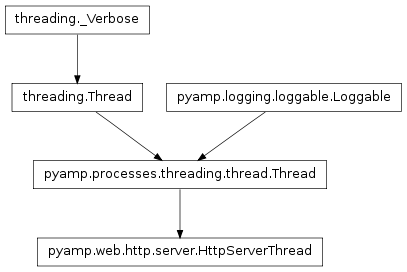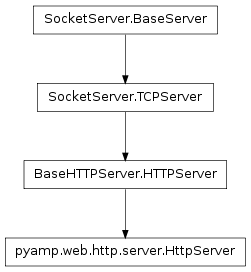The server module¶
The server module contains various classes pertaining to creating HTTP servers.
The Argument class¶

- class pyamp.web.http.server.Argument(argumentType, required=False, default=None)¶
The Argument class encapsulates the concept of an HTTP argument passed through a URL request.
Arguments can have a specific type, can be required or optional, and can have a default value if they are optional and not passed in the request.
- argumentType – The type of the argument
- required – True if the argument is required, False otherwise
- default – The default value for optional Arguments
- convertValue(value)¶
Convert the given value to the expected type of the Argument.
- value – The value of the argument passed in the request
- getDefaultValue()¶
Return the default value for this Argument.
- isRequired()¶
Determine if this is a required Argument or an optional Argument.
The HttpServerThread class¶

- class pyamp.web.http.server.HttpServerThread(port, requestHandlerClass, host='')[source]¶
The HttpServerThread class provides an implementation of an HttpServer that runs in its own thread.
Example:
from time import sleep from pyamp.web.http.requests import StoppableRequestHandler server = HttpServerThread(12345, StoppableRequestHandler) server.start() while True: try: sleep(0.1) except (KeyboardInterrupt, SystemExit): print "Stopping server!" server.shutdown() break print "Done."
- port – The port for the server
- requestHandlerClass – The class used to handle requests
- host – The host name for the server
- onCycle(_i)¶
Called once during every cycle of the thread.
- _i – The current cycle number
The HttpServer class¶

- class pyamp.web.http.server.HttpServer(port, requestHandlerClass, host='')[source]¶
Create a basic HTTP server.
Example:
from BaseHTTPServer import BaseHTTPRequestHandler class RequestHandler(BaseHTTPRequestHandler): def do_GET(self): print "GET:", self.path server = HttpServer(12345, RequestHandler) server.serve_forever()
- port – The port for the server
- requestHandlerClass – The class used to handle requests
- host – The host name for the server